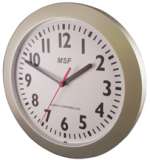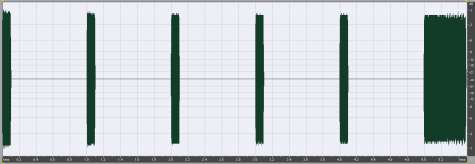For years, we’ve turned to the radio for precise time information. With digital radio on the scene, are things about to change?
Q. I have a digital radio, and I notice that the “pips” on Radio 4 are delayed. Why is this?
For many years, the five short pips, followed by a longer pip have been broadcast by analogue radio in the UK to enable people to set their watches accurately. The BBC has broadcast the Greenwich Time Signal since 1924.
Sadly, this precision time service is not so useful on digital radio, due to the delay that happens as a result of digital transmissions.
- DAB Radio: This form of digital radio uses encoding at the transmitter site, and decoding on the radio set. This process can add a delay. The delay is typically close to one second
- Digital TV: A similar encoding and decoding takes place for radio received via a digital TV. In the case of radio on Sky and Freesat, the delay is even longer due to the signal being bounced from an orbiting satellite
- Internet Radio: Here the delay can be several seconds (we’ve experienced a 20 second delay). This is due to the encoding and decoding used for streaming radio, the delay because of Internet traffic routing, plus the “buffering” effect on a PC or Internet radio receiver. The longer you listen, the more “out of step” you can get from live radio
So, what’s the answer?
Well, there isn’t really one as far as digital radio is concerned. The delay is part of the transmission process, and is the same for digital TV.
If you’re after time that’s accurate to less than a second, then there are other ways to get this:
- Use FM or LW radio: Radio 4 on FM and Long Wave is in analogue, and the time signals are accurate. The Government plans to switch stations like Radio 4 from FM as early as 2015, but until the service stops on FM, it’s available in the UK, and it’s not delayed.
 From a radio-controlled clock: These are available quite cheaply and get a signal that’s broadcast using analogue either from Cumbria, or from Germany. These radio-controlled clocks are very accurate, and available at reasonable prices. More on Radio-controlled clocks
From a radio-controlled clock: These are available quite cheaply and get a signal that’s broadcast using analogue either from Cumbria, or from Germany. These radio-controlled clocks are very accurate, and available at reasonable prices. More on Radio-controlled clocks
- From the good old speaking clock. Dial “123” from a BT landline, to get the precise time “at the third stroke”
More information



Even if the time delay of the pips is insignificant on analogue radio broadcasts eg long wave and FM, the distribution of the radio signals to the transmitters is almost certainly digital. I’m not sure how much delay an analogue to digital converter and its counter part add to the recieved signal. Any bbc engineer out there who can give the facts?
I have measured the delay on Radio 4 FM in Sheffield by comparing the received signal with that on 60 kHz from MSF at Anfield in Cumbria. Knowing the distance from Anfield it is easy to work out how long that signal takes to reach Sheffield and comparing it with GTS on Radio 4 FM I get a fairly consistent difference of 13 (+/-1) milliseconds. Very rarely there is a longer delay if the programme feeds to Holme Moss are on a backup route which has a longer path but that is very rare in my experience.
Could the problem of the delayed pips be at least reduced by recording a set of pips and transmitting these in advance, by the average of the current delay?
Can anyone tell me why, on certain occasions,recently, only 5 pips are broadcast, and not 6, the final longer pip being omitted?
Gordon,
It could be “crashing of the pips.” That’s when anything is broadcast over them, technically including the theme music at the end of some programmes. I would guess the same could apply to the starting music. Maybe the sixth pip is still there, just drowned out.
This digitization is a bit of a pain isn’t it – when it comes to time signals. I have seen as much as 17sec delay between the DAB Sports Extra cricket commentary and the LW TMS. The TV coverage of the same match is perceptibly different again. It doesn’t matter to the programme material, in fact I can catch up with an incident by switching from LW to digital BUT for a so called accurate time signal it’s a disaster! I have clocks & watches which are regulated down to the split second. Only the radio clock is true. The telephone speaking clock is slightly early (it seems to me). Fortunately the most important thing when regulating clocks is stability. Can we rely on the digital delay being consistent? I don’t think so. Different satellites, different times of the day, different routing. all say no you can’t.
Re. pips on digital radio; transmission delays are variable depending on the encoding and multiplexing method (coding and mux) for DAB and DVB transmission and encoding for internet. These delays are variable depending on the compression method and bit-rate used and will certainly be different between the various mediums (DVB, DAB, internet). In addition the receiver will add it’s own delay which will depend on it’s design and also the receiving conditions which will determine the bit rate used.
On Analogue radio, I believe the BBC have timed the Radio $ LW transmission from the Droitwich transmitter to be accurate within 100 miles of the transmitter, i.e. London.
In Conclusion, the pips should be accurate on LW Radio 4, slightly (milliseconds) less so on FM and wildly inaccurate on any digital format with seconds of delay that will vary depending on what you’re listening on, the TX path and how much your receiver is buffering.
incidentally, I believe BBC national radio use the MSF signal for timing the pips whereas local stations use GPS, probably from their house sync signal (a synchronising and time of day signal that all station systems will lock to, referred to as timecode (LTC or VITC)).
P.S. Prior to GPS, virtually all radio and TV stations used the MSF 60khz time signal to generate their house sync signal and timecode. Since GPS arrived, virtually everyone now uses it for sync.